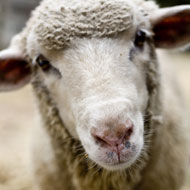
Antibiotic treatments could be contributing to antibiotic resistance
Sheep producers are being urged to vaccinate their flocks against enzootic abortion of ewes (EAE) rather than using whole-flock antibiotic treatments.
According to AHDB Beef & Lamb, there is a common misconception that using antibiotics just in case of abortion - and without a diagnosis - is cheaper than vaccination.
But the levy board says that ewes only need one vaccination, so the £2-£3 cost can be spread over their productive lifetime.
In a press release, AHDB said: ‘Any flock which buys in replacement ewes is at risk of introducing EAE and is advised to vaccinate for cost-effective prevention rather than risk the expense of disease.
‘Pharmaceutical companies’ data shows that around one million doses of vaccine are sold per year, but around three and a half million replacement ewes enter the UK flock every year.’
EAE is the most commonly diagnosed cause of abortion and causes around 50 per cent of sheep abortions in the UK.
AHDB says that in the face of an ‘abortion storm’, producers’ only option is to isolate aborted sheep for at least three to four weeks to reduce spread.
It adds that while an injection will reduce the risk of further abortions, many producers are opting for ‘unnecessary’ whole-flock antibiotic treatments as a preventative measure, which could be contributing to antibiotic resistance.
If switching to vaccination, vets will be able to work with producers to update their health and treatment plan, AHDB said. The vaccines currently available in the UK are:
- MSD’s Enzovax
- CEVA’s Chlamydia
- Benchmark’s Mydiavac
AHDB adds: ‘Ewes need to be vaccinated at least four weeks before they go to the ram, as options to vaccinate in-lamb ewes are limited. Together with robust biosecurity measures, changing to vaccination can reduce antibiotic use, reduce lamb losses and maximise ewe productivity.’



 The Veterinary Medicines Directorate (VMD) is inviting applications from veterinary students to attend a one-week extramural studies (EMS) placement in July 2026.
The Veterinary Medicines Directorate (VMD) is inviting applications from veterinary students to attend a one-week extramural studies (EMS) placement in July 2026.